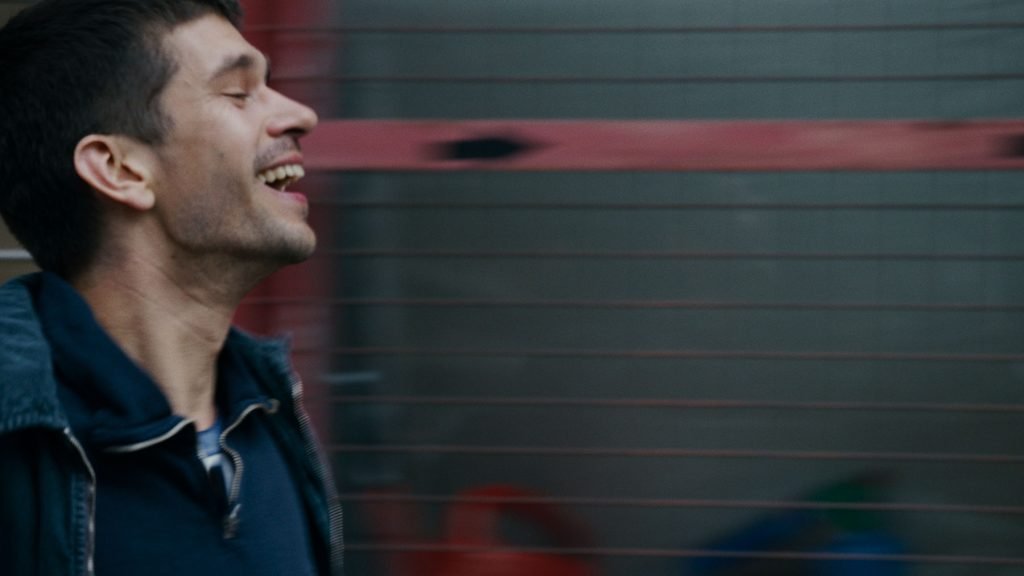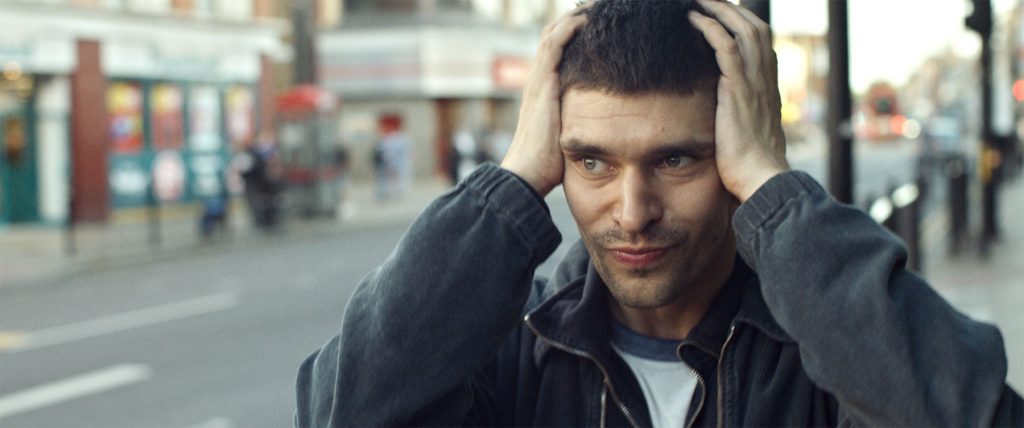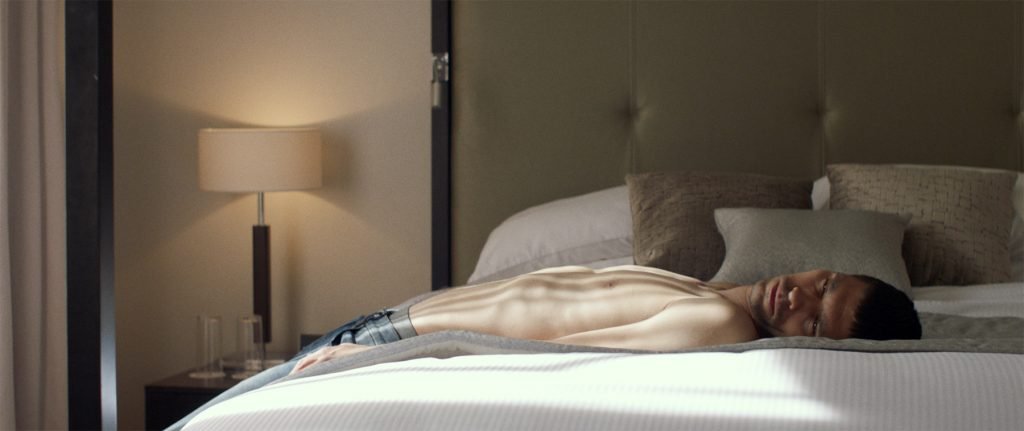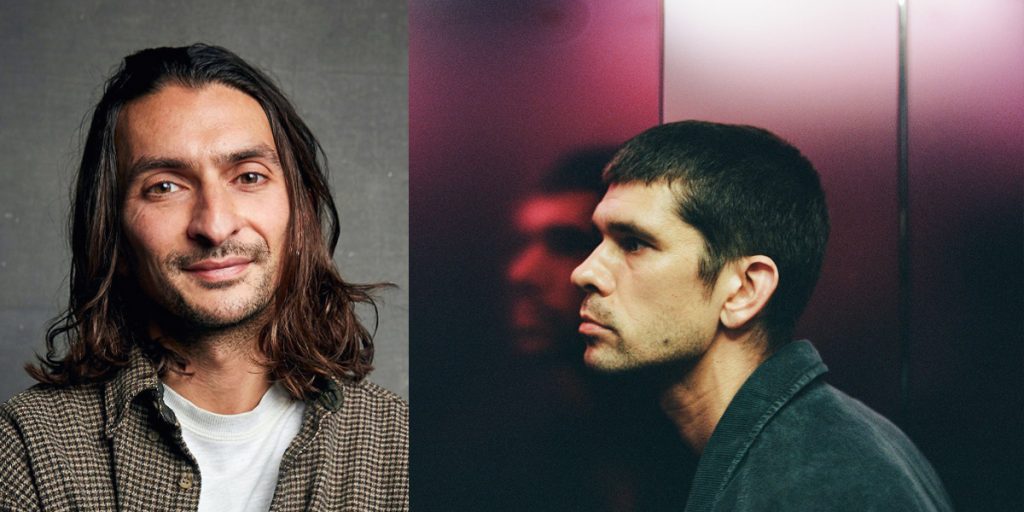We spoke with Aneil Karia, director of new thrilling feature Surge, a 24hrs reckless journey through London as a sensory and kinetic study of primal liberation.
Having been nominated at various film festivals for his short film Beat, Aneil Karia will take the world by storm with his first feature, Surge. The dazzling energetic sensory experience is carefully crafted to the minutest detail and follows the main character Joseph (Ben Whishaw, The Lobster, Cloud Atlas) who works as a security-guard at one of London’s airports, for twenty-four hours. Drained by his soulless job and his chiding parents, Joseph breaks under the strain of living a meaningless life and, through one act of rebellion, embarks on a reckless journey prowling the streets of London where he finally comes to life.
While Joseph becomes more erratic, manic, and violent, there is also a pulsing energetic feeling of mindfully living in the now. In liberating his primal instincts and ridding himself of conforming to societal notions of sound behaviour, Joseph ascends on a primal path of enlightenment. Creating a visual and physical world in which these transformations is certainly a tough challenge, but one Aneil Karia takes up with ease. The result is a visually and aurally stunning psychological snapshot of one man’s reliance on intuition and impulse. With Surge, Aneil Karia delves deeper into the human psyche and visualizes a primal voice with a kinetic energy that can only be achieved by carefully honed talent and experience.
In this interview, we spoke to Aneil Karia to learn what inspired him to create a story on primal liberation, how location and sound influence our experience of the world, and the challenge of turning a non-logical narrative into a script.
Behind the Scenes: Aneil Karia’s inspirations
Can you tell us a bit more on the origins of Surge? Is it based on your earlier short film Beat?
Kind of loosely. The short film certainly wasn’t some kind of proof of concept, but it was the beginnings of it, really. I made this short film with Ben Wishaw about somebody who was kind of living on the perimeters of society, who was behaving in a way that doesn’t conform to the kind of social contract we are meant to conform to, in his body and in his decisions. The short film had a really great reception and life, but Ben [Whishaw], Scott [O’Donnell, the short film’s producer] and I all felt like it was an area we wanted to explore more. This format of acceptable behaviour that we’ve kind of created and sleepwalked into for the past… however many centuries, is something we thought about a lot. I wanted to explore, on a bigger canvas, this idea that that is deemed the way to behave, and what that’s doing to us.
It’s been eight years between Beat and Surge. How did you develop the story?
Eight years ago, the idea of doing something similar was first maybe mentioned, but it was 2015 before it went into development properly. It started with the idea of bank robberies. I was quite interested in intrusive thoughts and these urges that every human being seems to get to do things that are clearly going to be detrimental to their life. They can range from the absurd, like standing up in a meeting and yodelling, to the really distressing ones, like harming your children or stepping onto the train tracks as a train comes. We don’t actually want to do these things but the body has the urge to, and I found that really interesting. I started thinking about that in conjunction with Beat and this character who is beginning to act on impulses and intuition.
How is Surge different from other bank robbery films?
I have always wanted to know what it would actually be like to rob a bank; how surreal it would be. We’re used to watching extremely professional Hollywood Alpha male criminals rob banks. When I researched bank robberies, I discovered a big psychological study from a University in America in the 90s. They discovered that 65% of bank robbers had never committed a crime in their lives before, and far from being these Alpha male DeNiro types they were ‘meek invisible’ men on the peripheries of society. Sometimes they did need money, but that was not their motivator, it was actually motivated by a desire to reinvent themselves and feel like a different person. A bank robber had become this kind of ready-made Alpha type of real-man-identity that you take on. All these often troubled men were doing this sometimes completely on impulse almost like Joseph does in the film. So, there were two interest here: the first was about what would it be like to try and live the real experience or as real as possible and experience what it would be like. Secondly, there’s this broader exploration of somebody who decides not to conform to society’s rules anymore.

Character Development and identity
How did you develop the character’s identity and backstory?
It was tricky because the film pries back quite abstract, sometimes esoteric, themes about what it means to be human and what it means to feel. The film scratches the surface of the superficial existence that we are all trapped in, and gets back to something more animal and primal. However interesting these themes are, harnessing them in a script was not straight forward, as you can imagine. You go down a lot of wrong turns before you start to find the right film. I created challenges for myself, to be honest. Where with a film of somebody robbing banks it’s very easy to start answering questions such as why he needs that money, I wanted to always stray well clear of that. I wanted his motivator for these robberies to be much more existential and primal, and difficult to understand. It’s much neater in a film to know and understand exactly why that somebody is making those decisions, but I wanted to shed all logic, and get into something hazier and more complicated. That makes life harder for yourself, but it was what I wanted to do.
Surge switches a lot between the perspective of Joseph himself and then the perspective of the outside viewer, observing him. In Beat, there is a ‘deranged man’ credit for a character who acts in a similar way as the main character.
Is there a social critique, in Beat and in Surge, as in how we, as society, see these people?
We decided to call that the character you mentioned what the audience would recognise him as. However, in terms of mental health and Joseph’s mental health in Beat and in Surge, I tried not to explore in any definitive or prescriptive sense what a psychotic breakdown looks like. What I did explore was societies’ binary definitions of what constitutes somebody who’s mentally well, and what constitutes somebody who’s mentally unsound. I wanted to explore the blurry and complex space in between that. Of course, I don’t deny that Joseph is going through a troubled and challenging mental journey. That is also what I wanted to show with the film, this physical sense that he is heading towards oblivion and (self-)destruction. In an emotional and almost spiritual sense, he’s also being liberated from this imprisoned drone version of himself that has been living supposedly ‘well’ for however many years.

On Set: Aneil Karia on location and sound
One big difference between Beat and Surge is that Joseph seems more self-destructive compared with the happy character in Beat. Do you think this is because of how society has changed these past years?
With the short film, the big difference is that we were looking at a snapshot of this character’s kind of day, and, it being a short film, it’s difficult to penetrate a deep understanding of this character. Also, there’s a bit of a difference in that it feels like we were outside looking in with this character, whereas, with Surge, we go with him and live that experience with him. That’s why I think it’s more stressful, as well as it being longer. But you’re also definitely right: when I was making Beat, I was younger, for a start, and, even-though I wanted the roaring slightly dangerous energy that came with any big city, it felt like a more thrilling world. I was inspired by this idea of a city being able to be, in one minute, a kind of glorious paradise with all these souls coming together and living their life and there’s so much good energy to it, and then, the next minute, also be this oppressive suffocating kind of hell. It just depends on your mental state, or the weather, or these tiny, nuanced factors that can switch from one moment to the other. I feel like, in the past decade, the world actually is becoming heavier, a more oppressive feeling of space. I don’t know if that’s just about getting older or the world generally changing.
Is that the reason why you chose specific parts of London as the setting for Surge?
I’m always trying to capture the authentic energy of London, which I sometimes feel like I don’t see on TV and film. Having lived there, I don’t recognise the London I see on film and I really like the challenge of capturing the real lived energy. Having said that, there’s hundreds of different pockets of London with their own different energies, and I am drawn to the more throbbing kind of kinetic environment. I find these spots, where traffic and thousands of humans and the potential for incident and chaos is simmering away in just one street, fascinating and thrilling. I wanted to find that, and I wanted Joseph to live within that, because I also think there’s something very unhealthy about living in it. Just spending 24 hours a day eating sleeping, breathing in that kind of energy, thinking of what it’s physically doing to you and what it’s doing to your mind. Even just that space, as he walks back to his parents after this huge journey he’s gone on, you can almost feel all that air and the space around him, and that’s just the suburbs. You don’t feel this in these places in London, so that’s why I was trying to choose them. I was trying to choose the most thrilling but also oppressive parts of London.
The traffic noise and just the noise of the city as well really ties in with this. The music in the film is a very liberating experience for him. Spiritual might be too strong a word, but is there any liberating sense to music that we need more of in society to release tension?
I don’t think spiritual is a too strong word: I wanted there to be a kind of transcendence. Music is hugely important to me, as it is to most people. There was a hip hop track coming from the car, and an Indian dance at the end, which were both almost spiritual experiences for him. Joseph began to feel music, rhythm, and melody in the city itself and I definitely think there is some spiritual importance about music. We had an incredible sound designer [Paul Davies] working on the film, and I enjoyed how we almost created music even when there wasn’t music per se. Beat was heavy on music, and I definitely wanted it to be an important element in Surge.

Looking Ahead: What’s next in store for Aneil Karia and Surge
Will there be a sequel of what happens after Joseph’s liberation?
I don’t think so. it’s a nice idea just because I loved everyone we worked with, and I love working with Ben. It is intriguing to imagine what Ben’s character would look like beyond this, in his prison cell or wherever, but I don’t think it would be the right move. What happens after liberation is certainly a theme I’d like to explore more, but whether it’s in the form of a sequel, I’m not so sure.
Are there any other projects you are working on at the moment?
Slowly, but yes. Surge took a long time to figure out in my head and, unfortunately, I’m just one of these people where ideas come, and they move like oil tankers. They present themselves neatly in my mind and then take a long while, it’s a bit of a slug. There’s a couple of really interesting feature films I came on board of, and then there’s a couple that I’m trying to develop myself. They’re all in early stages, and obviously the past year has meant things have perhaps slowed down a little bit. But I’m looking forward to cranking up the pace a bit in the next few months and getting something moving. Cause yeah, I’m getting hungry again!
Surge had its UK premiere at the Glasgow Film Festival on Friday March 5, 2021, and is now available to watch on digital platforms.

